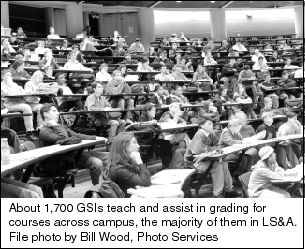The University Record, March 8, 1999
GEO plans walkout for March 10
By Rebecca A. Doyle
 Graduate student instructors (GSIs) dissatisfied with the University’s latest offer on the bargaining table have planned a work stoppage for March 10–11.
Graduate student instructors (GSIs) dissatisfied with the University’s latest offer on the bargaining table have planned a work stoppage for March 10–11.
“Students should continue to go to classes and should wait the designated time before leaving if no instructor appears,” says John Cross, associate dean for budget and administration in LS&A. “Many of our students have been asking the departments what to do on Wednesday, and our general answer is ‘Go to class’.” University policy says that the responsibility for courses and their content rests with the faculty, noted both Cross and Daniel Mazmanian, dean of the School of Natural Resources and Environment, and faculty are expected to have scheduled classes meet.
Although many of the issues had been resolved before students left campus Feb. 27 for term break, three key points remain in contention. Bargaining talks are not scheduled to resume until late today (March 8).
University chief negotiator Dan Gamble says that members of the Graduate Employees Organization (GEO) were calling for a 9 percent increase in pay each year for the next three years, disagreed with the University’s proposal to change the employment fraction for GSIs who work between 16.5 and 19 hours per week, and wanted international students covered by the contract when they arrive on the campus in August instead of Sept. 1.
In a letter sent to University faculty members last week (click here for letter), Provost Nancy Cantor said she believes the University has made “fair and generous” proposals that are responsive to the needs of GSIs on the first two issues, and explained in depth the frustrating nature of the situation facing international student GSIs.
Gamble said the University has offered to match the rate of increase to the average rate received by LS&A faculty, an increase agreed to in 1996, when GEO members also made wage increases a bargaining point. Since then, GSIs have received annual increases of 3.1 percent, 4.0 percent and 4.6 percent. Approximately 75 percent of U-M GSIs teach classes through LS&A, with substantial numbers also in the College of Engineering and the School of Music.
Both Cantor and Gamble call the University’s offer to reconfigure the employment calculation for GSIs with a 40 percent appointment “generous.” The proposal would use funding from the Office of the Provost to allow GSIs teaching 16.5 to 19 hours per week to be paid at a 50 percent appointment rate, effectively increasing the wages of more than 500 GSIs by 25 percent. Funds “will come from my office,” Cantor said in her letter, “and they are being provided under the condition that the schools and colleges do not increase the amount of work required of GSIs who are currently appointed with 40 percent appointments.”
Cantor and Gamble also agree that the issue surrounding international graduate students who come to the University is a difficult and frustrating one.
“GEO wants these students covered by the contract, but the University says they can’t be until they go through the workshop and are appointed on Sept. 1,” Gamble explains. Since 1996, international students who want to be LS&A GSIs have been required to pass a workshop assessment at the English Language Institute before their appointment begins. But since they cannot be employed by the University until they have passed the workshop assessment, Gamble says, they are not employees of the University when they come in August to take it.
Cantor says the University has now clarified a policy that provides these students with room, board and a modest stipend until their appointment at the University is confirmed.
According to Gamble, the bargaining team has urged GEO members to agree to mediation, where a third party would come in and assist in reaching a settlement. Mediation offers have twice been rejected by the organization. In any case, the University will continue to meet with GEO representatives to resolve the remaining issues.

